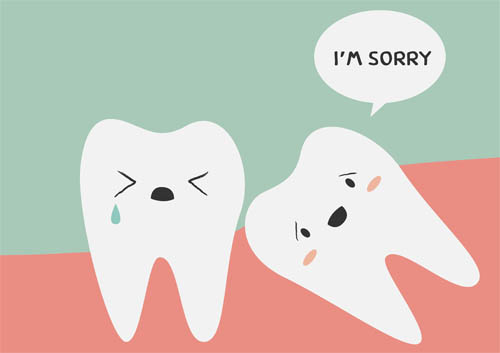Warning Signs of Impacted Wisdom Teeth
January 8th, 2020

When your wisdom teeth start to emerge it can definitely be painful, but it can be even worse if your wisdom teeth become impacted. Impacted wisdom teeth are trying to erupt but are unable to do so because there is not sufficient room for them to emerge. This usually means that your wisdom teeth are painfully lodged in your jawbone.
While you may not see any real signs of the emerging wisdom teeth when they are impacted, what you can’t see can still definitely hurt you. Some of the indicators of impacted wisdom teeth are listed below.
- Jaw Pain: Pain in the back of your jaw is a common indicator of impacted wisdom teeth. The pain often concentrates in the area around your gums.
- Changes in the Mouth: You may notice some changes in your mouth when you have impacted wisdom teeth. Reddish gums, swelling in the jaw, bleeding gums, and bad breath can all be indicators that you are dealing with impacted wisdom teeth.
- Headaches: If you suddenly start having headaches, especially at the same time as some of the other issues mentioned above, they may indicate impacted wisdom teeth.
- Chewing Issues: Problems with chewing normally can indicate impacted wisdom teeth. If you are having trouble making the chewing motions because your mouth won’t quite open and close as easily as it used to, impacted wisdom teeth may be the culprit.
The Solution
If you are suffering from impacted wisdom teeth, the best solution is usually going to be removal. This is not a problem that will resolve naturally, and in fact, your pain and other symptoms may worsen as your wisdom teeth become increasingly impacted. At Dr. John Rottschalk Dental Group, Drs. Rottschalk, Acker, and Froidcoeur can review the details of wisdom teeth removal surgery with you and help you determine if this is the best solution for your situation.
Smile, the New Year is Almost Here!
January 1st, 2020

We’ve been celebrating the new year for a really, really long time. It goes way back, but it started formally in 1582, when Pope George XIII made January 1st the official holiday for ushering in the new year. The idea was to yell, cheer, and blow horns to scare away all the evil spirits of the previous year with the hope that the new one would be filled with happiness and opportunity.
While scaring away evil spirits isn’t what’s on our mind these days, we still ring in the New Year by cheering and hollering with friends and family. It’s a time to set new goals, refocus on old ones, and look forward to all the surprises the coming year will bring.
Whether you’re saying hello to the New Year snuggled up at home on your couch in the Fairview Heights, IL area or by gathering your friends for a social celebration, here are some tips to help ensure you welcome this new chapter with a smile.
Tips for a great New Year’s Eve celebration from Dr. John Rottschalk Dental Group
- Stay safe. This one’s vital, because nothing puts a damper on your party like an emergency trip to the hospital. Stay responsible and try to plan ahead, whether that means taking a taxi, staying with a friend, or recruiting a designated driver. Do what you have to do to keep yourself and everyone around you safe.
- Spend time with the people you love most. The way we see it, the whole point of the holiday season is to cherish your family and friends. Regardless of what you’re doing, make sure there’s something for everyone. It’s essential to do something the whole group will enjoy!
- Smile! Whether you get all dressed to go out or have a quiet gathering with family and friends, make sure you accessorize with a smile. There’s always something to smile about!
We can all agree that change can be scary sometimes, but ringing in the New Year is an observance we all welcome with open arms. We hope you’ll enjoy this transitional holiday in a fun, healthy, and safe way. You have endless possibilities ahead of you!
From Drs. Rottschalk, Acker, and Froidcoeur, have a fantastic New Year!
Brushing Your Toddler’s Teeth
December 25th, 2019

At Dr. John Rottschalk Dental Group, we know that brushing your toddler’s teeth can be an intimidating prospect. So we’re providing a few tips in the hope of making the process a lot more easy, effective, and all-around enjoyable for everyone!
Start by getting into a position that gives you control and enables you to see well into your child’s mouth. If you can see clearly, you will be able to maneuver the toothbrush better around your son or daughter’s mouth for a better quality of brushing.
It’s important to choose a time when your toddler is calm. Have your little one sit with his or her favorite stuffed animal, or play a fun movie in the background so your child can focus on something comforting while you’re brushing.
Using a circular motion, brush all sides of their teeth. Be sure to let your toddler have a turn after you’re done, to start getting used to it. This way, he or she is more likely to repeat the brushing and flossing exercise when your youngster is old enough.
Drs. Rottschalk, Acker, and Froidcoeur and our team agree that brushing and flossing need to be performed with kindness and care. To ensure your child learns good dental hygiene habits early on, be gentle and make this time a happy, learning time.
Your child should also have regular appointments at our Fairview Heights, IL office for checkups and cleanings to keep on track!
Playing “Tooth or Dare”
December 18th, 2019

Our teeth perform several vital roles for us. We use them to bite and chew, to help form words, to support our facial structure. And never underestimate the power of a smile!
But once you try to expand that job description, you are asking for trouble. Using your teeth for tasks they were not designed for is a game no one wins. What are some of the worst moves you can make? Putting your teeth into play as:
- Ice Crushers
Crunching hard objects like teeth and ice cubes together can have one of two results—the ice will give, or your tooth will. If your tooth is the loser, you can expect cracks, fractures, worn enamel, and even dislodged crowns and fillings. If you’re tempted to chew on the ice in your drinks, try asking for a straw or using slushy ice instead. (The craving for ice can also be a symptom of other medical conditions—check with your doctor for more on that subject.)
- Bottle Openers
If ice vs. teeth is a bad idea, metal vs. teeth must be a really bad idea. Those sharp hard metal caps can be difficult to remove even with a bottle opener. Don’t take a chance on chipped, fractured teeth and lacerated gums to get to that beverage faster/work around a lost opener/impress your friends.
- Nut Crackers
Just because nuts offer more protein than ice doesn’t make their shells any safer to crack with your teeth. Besides the danger of fractured teeth and eroded enamel, biting on whole nuts can produce sharp splinters of shell that can damage delicate gum tissue. By all means, enjoy nuts—they pack a lot of nutrition in a small package. But buy them already shelled, or invest in a nutcracker.
- Cutting Tools
Teeth aren’t meant to be scissors or utility knives. Even if you are trying to bite through the top of a relatively soft bag of chips, or a piece of duct tape, or a tag that just won’t come off your new clothes, you are putting pressure on your teeth in ways that they are not meant to handle. Don’t take a chance on chips and fractures.
- A Helping Hand
Using your teeth to hold the straps of your heavy bag, or the leash of your well-trained pet—what could go wrong? How about an awkward fall? Or a squirrel? Or something that might possibly be a squirrel? Any fall or force that applies violent pressure to your teeth and jaw is a potential for dental disaster.
- Stress Relief
You might grind your teeth or bite your nails whenever you feel nervous. Please find another form of stress relief! Grinding and clenching the teeth can lead to worn enamel, jaw pain, broken teeth and restorations, and a host of other problems. Biting fingernails is not only hard on your nails, but also introduces bacteria into your mouth and can cause damage to your tooth enamel.
If you grind your teeth at night, ask Drs. Rottschalk, Acker, and Froidcoeur about a nightguard during your next visit to our Fairview Heights, IL office.
This is real life, and you really don’t want to be playing “Tooth or Dare” with your dental health. Use your teeth for what they were designed for, and you’ll take home the grand prize—a lifetime supply of beautiful, healthy smiles.





